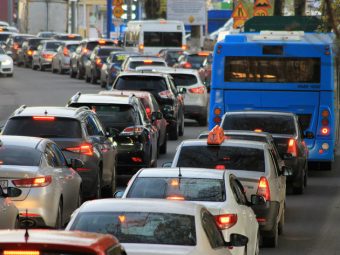
At a time when we face enormous challenges brought on by the COVID-19 pandemic, it is heartening to see the world mobilizing as never before to tackle the looming crisis of global warming. From renewable energy to carbon markets to sustainable agriculture, countries are taking steps to address emissions and enhance resilience. The international development community is also stepping up.
In 2020, the World Bank Group reached its highest ever level of climate financing, at 21,4 billion dollars, and we recently announced our plan to align all-new World Bank operations with the Paris Agreement by July 2023.
But despite all the positive momentum, there is one area in particular that requires urgent action: transport. Without decarbonizing transport, no scenario for achieving the 1,5-degree climate goal is feasible, and there we are currently heading in the wrong direction. The global transport sector emits around 24 percent of the world’s total energy-related carbon emissions, and this is expected to grow by 60 percent by 2050.
There are various aspects of transport that pose challenges for a low carbon transition. It is highly decentralized, spanning rail, road, air, and maritime. Human behavior plays a large role in travel demand patterns and is difficult to manage. Most importantly, many countries, especially in the developing world, lack policy instruments and investments to address the climate impact of the transport sector.
More:
The pressing need to address transport’s many challenges brought some of the most important partners to the World Bank Group Spring Meetings last week. Transport is one key area where transformational action is needed under the Bank Group’s green, resilient, and inclusive development (GRID) approach , which framed discussions at the Meetings.
One central obstacle is that transport lacks global instruments to create, test, nurture, coordinate, and scale-up solutions. To develop solutions at scale, the World Bank, other multilateral development banks, bilateral development agencies, and the private sector will need to come together and leverage their resources.
This is why we have launched the Global Facility to Decarbonize Transport (GFDT), a major multi-donor trust fund that is wholly focused on solving the transport decarbonization issue, and tackle related challenges from access to safety. It aims to make transport decarbonization the catalyzer that will help improve lives, create opportunities—especially for the poor, women, and girls—and boost country competitiveness. This can be accomplished by expanding the horizon for cooperation and coordination, as well as leveraging resources and influencing investments at a global level.
The synergies are strong: Bus Rapid Transit systems take cars off the roads, increase access to mobility, and are an important part of many country national climate targets or NDCs; safe transport and lower speeds allow cities to open spaces for walking and biking; better regulation of used car exports to developing countries—which in some cases represent over 90 percent of national fleets—can significantly reduce emissions, pollution and save lives with safer cars; and investing in e-mobility and other emerging technologies can help increase the competitiveness of cities and countries.
Author: Mari Elka Pangestu
Source: World Bank



